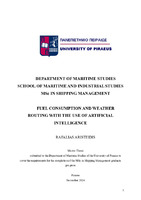| dc.description.abstractEN | This thesis explores how artificial intelligence (AI) can be used to solve two important problems facing the maritime sector: maximising fuel efficiency and putting effective weather routing into practice. The shipping sector, a vital component of international trade, is coming under growing pressure to lessen its environmental impact without sacrificing operational
effectiveness. This study investigates the revolutionary potential of AI-driven approaches in accomplishing these objectives.
The study starts by placing the economic and environmental issues facing the shipping sector in context and highlighting how urgent it is to comply with global laws like the Energy Efficiency Operational Index (EEOI) and the IMO 2050 agenda. These frameworks emphasise how important it is to implement creative ways to reduce greenhouse gas emissions and
improve energy efficiency. The technical foundation of this thesis is a comparison of two prediction techniques:
Deep Neural Networks (DNN) and the Simplified Naval Architecture Method (SNAM). While SNAM provides a simple approach to fuel consumption estimation based on environmental parameters and vessel design, DNN uses complicated, nonlinear data interactions to achieve greater forecast accuracy. While more work is required for containerships, the analysis shows
that DNN is advantageous in situations involving bulk carriers and oil tankers. The study also looks at how AI is being incorporated into weather routing, demonstrating how it can evaluate real-time weather data to create the best routes that save fuel and improve safety. Case studies demonstrate observable advantages in fuel economy, cost reduction, and environmental compliance, including AI-based technologies like OptiNav and Sofar Pathfinder. In the end, this study highlights AI's potential to completely transform the marine sector by providing workable solutions for sustainability and legal compliance. The results support the wider use of AI technologies to promote environmental responsibility and efficiency in international shipping. | el |


